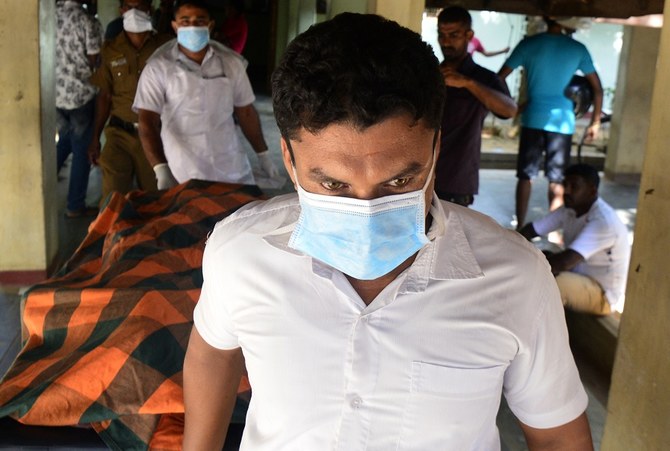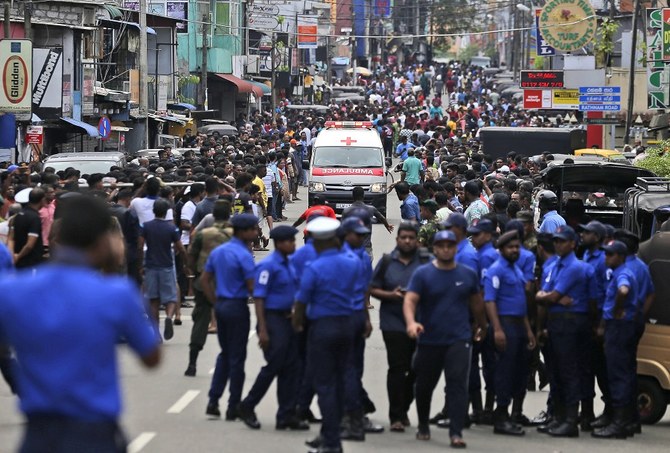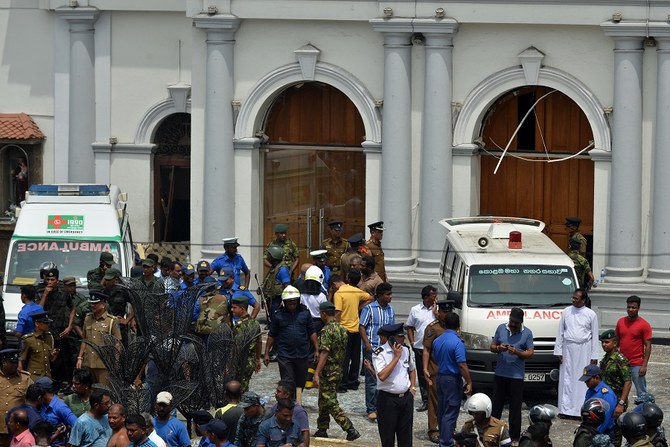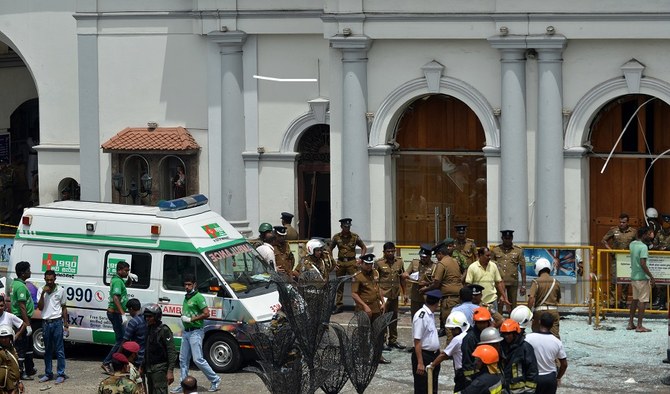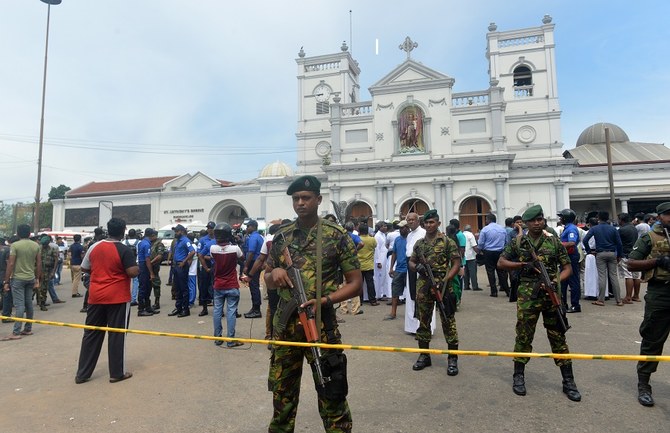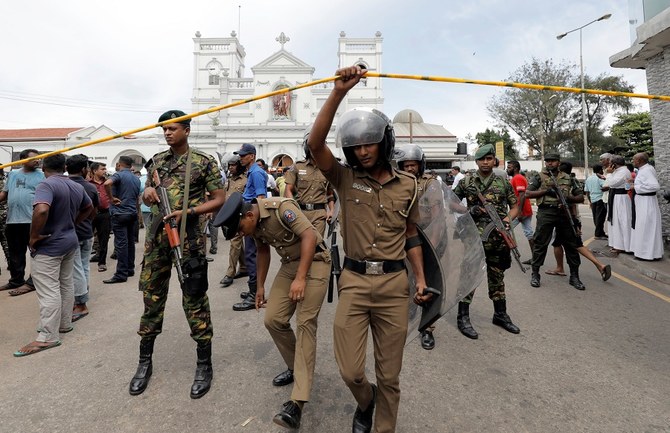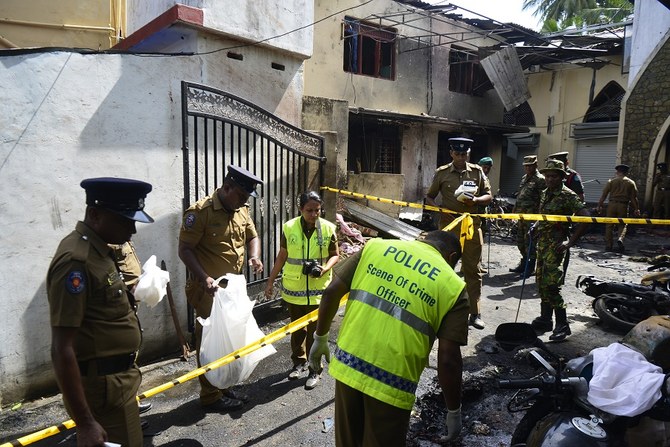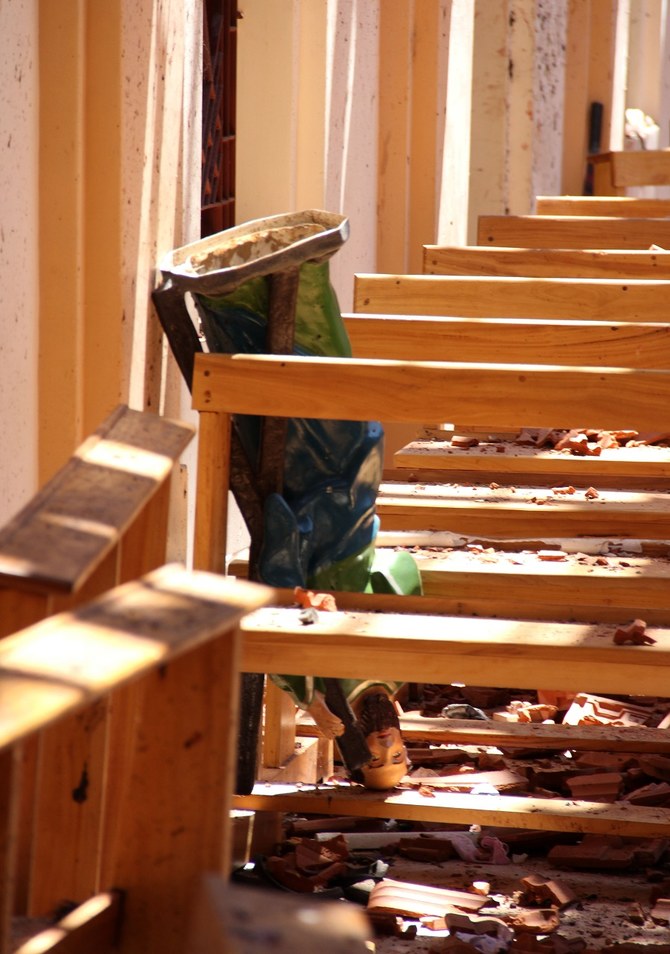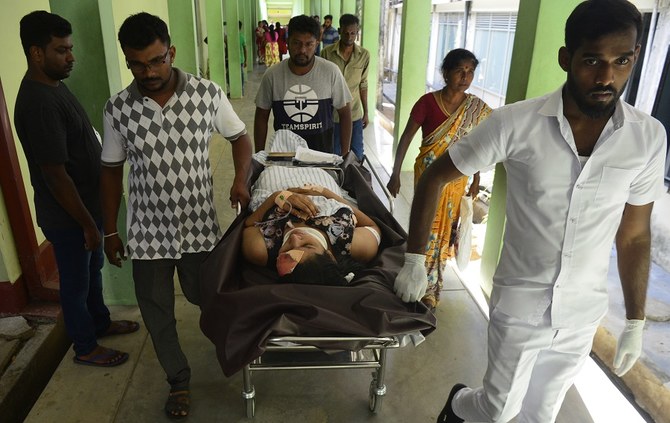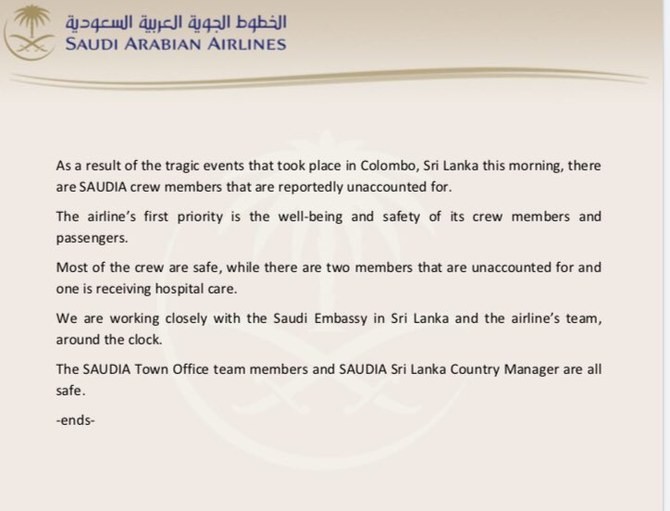COLOMBO: Seven suspects were arrested in connection with the Easter Sunday bomb attacks on eight churches and hotels in Sri Lanka that left more than 290 dead and hundreds more injured, the country’s defense minister said 10 years after the end of a civil war in which bomb blasts in the South Asian nation were common.
The string of assaults rocked the capital of Colombo and Batticaloa in Sri Lanka’s Eastern Province.
Anil Jayasinghe, director general of hospitals at the Ministry of Health, told Arab News there were foreigners among the dead, while nearly 500 wounded people had been taken to various hospitals for treatment.
A police official said that 35 foreigners were among the dead and hospital sources said British, Dutch and American citizens had been killed, with Britons and Japanese also injured. A Portuguese man and two Chinese citizens were among the dead, news agencies in their countries reported.
Three police were killed during the raids on a house in Colombo on Sunday afternoon after the government announced it would impose a country-wide curfew and suspended social media.
By the early evening the death toll had reached 207, with 450 people injured.
Prime Minister Ranil Wickremesinghe called a National Security Council meeting at his home. An island-wide curfew was announced.
“I strongly condemn the cowardly attacks on our people today. I call upon all Sri Lankans during this tragic time to remain united and strong,” the prime minister said in a Twitter post.
“Please avoid propagating unverified reports and speculation. The government is taking immediate steps to contain this situation.”
As of Sunday evening local time, no group had claimed responsibility for the attacks, which targeted a country that fought a decades-long war with Tamil separatists until 2009, but where there has been a lull in violence for at least a decade.
The curfew will begin on Sunday night at 6 p.m. local time (1230 GMT) and run until 6 a.m. local time (0030 GMT).
Access to major social media platforms and messaging services were suspended temporarily by the Sri Lankan government.
Police spokesman Ruwan Gunasekera said the seventh blast hit a hotel in the southern Colombo suburb of Dehiwala, killing two people.
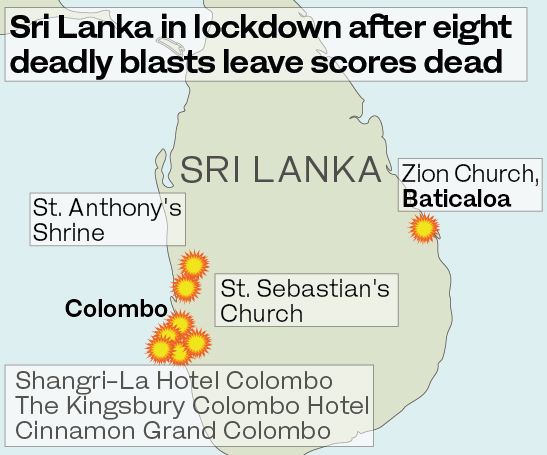
Brahma Chellaney, a professor of strategic studies at the Center for Policy Research in New Delhi, told the New York Times that radical groups had been quietly growing in influence for years in Sri Lanka, as well as in the nearby Indian state of Tamil Nadu and the island nation of the Maldives.
Chellaney said it was unexpected that the attackers had the confidence to raid hotels in Sri Lanka, saying that such establishments had tried to provide tight security during the island’s civil war and ever since.
The first blasts took place at three churches celebrating Easter Mass on Sunday morning: St. Anthony’s Shrine in Colombo, St. Sebastian’s Church in Negombo, 20 miles north of the capital, and Zion Church in the eastern city of Batticaloa.
Saudi Arabian Airlines made an announcement in Arabic and in English on Sunday following the attacks, that there were SAUDIA crew members unaccounted for.
“The airline’s first priority is the wellbeing and safety of its crew members and passengers.
“Most of the crew are safe, while there are two members that are unaccounted for and one is receiving hospital care. We are working closely with the Saudi Embassy in Sri Lanka and the airline’s team, around the clock.
“The SAUDIA Town Office team members and SAUDIA Sri Lanka Country Manager are all safe,” the report added.

Eyewitness reports came in from Sri Lanka of the moments leading up to the attacks.
In one case a suicide bomber waited patiently in a queue for the Easter Sunday breakfast buffet at Sri Lanka's Cinnamon Grand hotel before setting off explosives strapped to his back.
Carrying a plate, the man, who had registered at the hotel the night before as Mohamed Azzam Mohamed, was just about to be served when he set off his devastating strike in the packed restaurant, a manager at the Sri Lankan hotel said.
“There was utter chaos,” said the manager.
The Taprobane restaurant at the hotel was having one of its busiest days of the year for the Easter holiday weekend.
“It was 8:30 a.m. and it was busy. It was families,” the manager said.
“He came up to the top of the queue and set off the blast,” he added.
“One of our managers who was welcoming guests was among those killed instantly.”
The bomber also died. Parts of his body were found intact by police and taken away.
Other hotel officials told how the bomber, a Sri Lankan, checked in giving an address that turned out to be false, saying he was in the city for business.
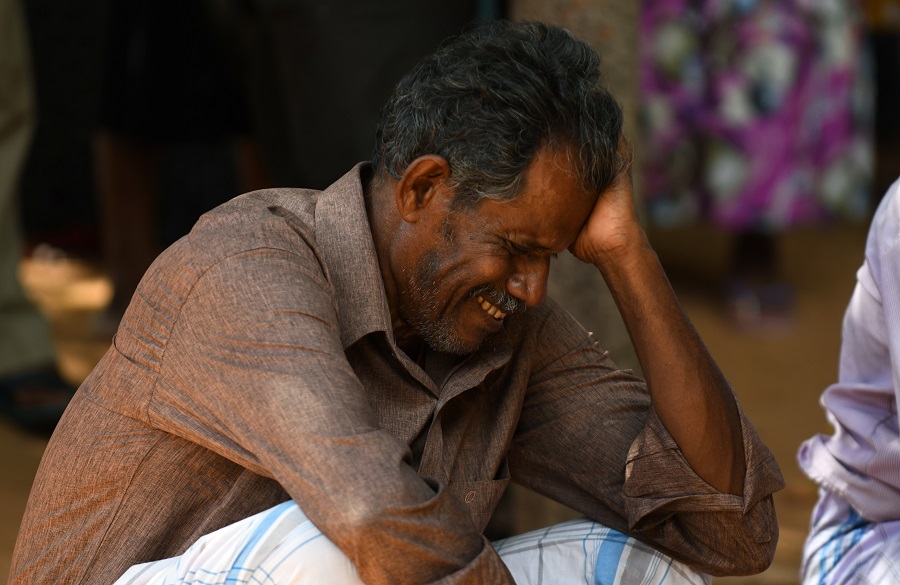
A relative of a Sri Lankan victim of an explosion at a church weeps outside a hospital in Batticaloa in eastern Sri Lanka on April 21, 2019. (Lakruwan Wanniarachchi/AFP)
There were also explosions at three five-star hotels in Colombo: The Shangri-La, the Cinnamon Grand and the Kingsbury. A fourth blast was reported at another Colombo hotel late in the afternoon.
Samanthi Samarakone, of the Colombo National Hospital, said the death toll had been rising throughout the day as people were brought in with a range of injuries, including many who were in a critical condition.
Western Province Gov. Azath Salley called the attacks “barbaric,” saying they were carried out to tarnish the image of Sri Lanka internationally. “The country was peaceful and calm during the past 10 years after the end of the ethnic conflict,” he said.
Parliament, which was prorogued for the April holidays, was summoned for Tuesday, while government schools, which were scheduled to be opened on Monday, will now be shut until Wednesday. Kataragama, a pilgrimage town that is sacred to Buddhists, Hindus and the indigenous Vedda people of Sri Lanka, will remain closed indefinitely.
Security officials said security had been tightened around Colombo airport.
The Archbishop of Colombo, Cardinal Ranjith, said the style and nature of the attacks indicated an organized plan and urged the government to take immediate action to apprehend the culprits.
The blast at St Anthony's Shrine, an historic Catholic Church, was so powerful that it blew out much of the roof, leaving roof tiles, glass and splintered wood littering the floor that was strewn with bodies.
A hospital source said Americans, British and Dutch citizens were among those killed in the blasts.
World leaders have also expressed solidarity with Sri Lanka, condemning the terrorist attacks.
The public has been told to excercise caution in the following days.
I strongly condemn the cowardly attacks on our people today. I call upon all Sri Lankans during this tragic time to remain united and strong. Please avoid propagating unverified reports and speculation. The government is taking immediate steps to contain this situation.
— Ranil Wickremesinghe (@RW_UNP) April 21, 2019
As the attacks were happening news broke that the country’s police chief had made a nationwide alert 10 days before the attacks that suicide bombers had planned to hit “prominent churches,” according to a document seen by AFP.
Police chief Pujuth Jayasundara sent an intelligence warning to top officers on April 11 setting out the threat.
“A foreign intelligence agency has reported that the NTJ (National Thowheeth Jama’ath) is planning to carry out suicide attacks targeting prominent churches as well as the Indian high commission in Colombo,” said the alert.
The NTJ is a radical Muslim group in Sri Lanka that came to notice last year when it was linked to the vandalization of Buddhist statues.
A police official, speaking on condition of anonymity, said at least 42 people were killed in Colombo, where three hotels and a church were hit.
#BREAKING 52 Dead,300 injured in multiple blasts in Sri Lanka's churches, hotels. Total 6 blasts including three churches and three hotels in and around the Sri Lankan capital of Colombo#SriLanka #SriLankaBlasts #Colombo pic.twitter.com/7EilN90tE9
— YuppTV (@yupptv) April 21, 2019
“A bomb attack to our church, please come and help if your family members are there,” read a post in English on the Facebook page of the St. Sebastian’s Church at Katuwapitiya in Negombo.
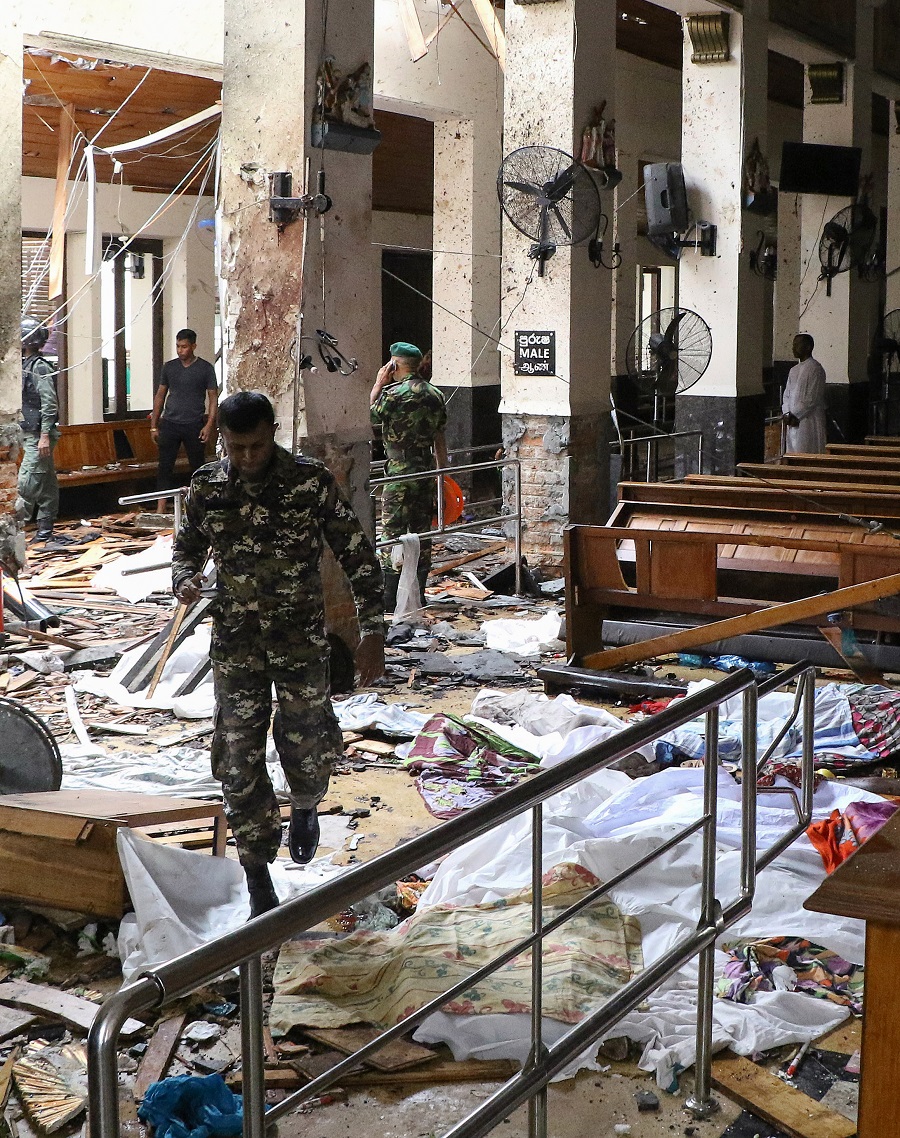
Inside St. Anthony's Shrine where one of the bombings took place. (AFP)
An official at one of the hotels, the Cinnamon Grand Hotel near the prime minister’s official residence in Colombo, told AFP that the blast had ripped through the hotel restaurant. He said at least one person had been killed in the blast.
An official at the Batticaloa hospital told AFP more than 300 people had been admitted with injuries following the blast there.
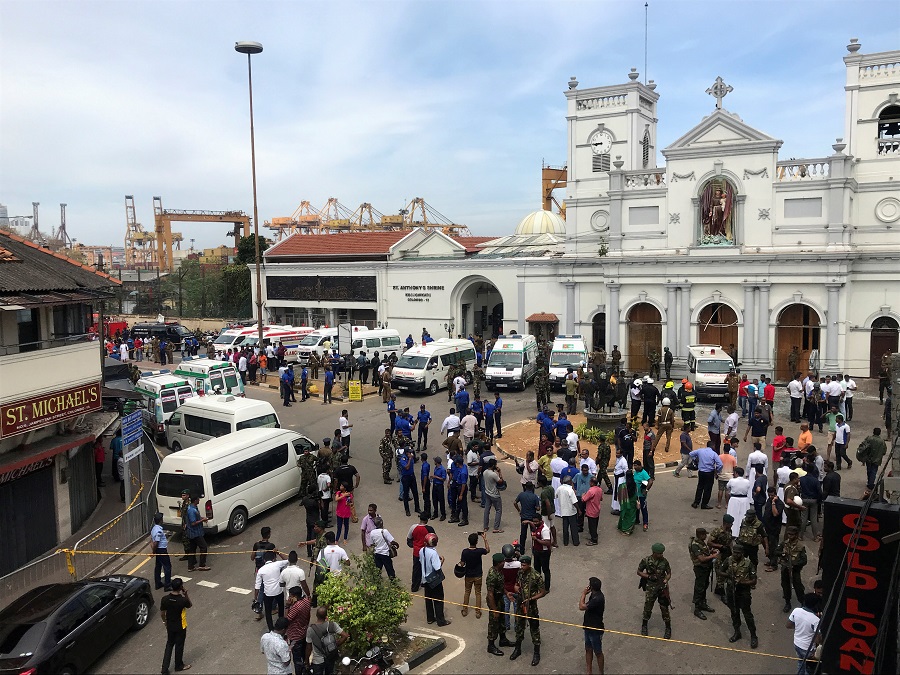
(Reuters)
“Emergency meeting called in a few minutes. Rescue operations underway,” Sri Lanka’s Minister of Economic Reforms and Public Distribution, Harsha de Silva, said in a tweet on his verified account.
He said he had been to two of the attacked hotels and was at the scene at St. Anthony’s Shrine, and described “horrible scenes.” “I saw many body parts strewn all over,” he tweeted, adding that there were “many casualties including foreigners.”
“Please stay calm and indoors,” he added. Photos circulating on social media showed the roof of one church had been almost blown off in the blast.
The floor was littered with a mixture of roof tiles, splintered wood and blood. Several people could be seen covered in blood, with some trying to help those with more serious injuries. The images could not immediately be verified.
Dozens killed, hundreds injured in #SriLanka attack pic.twitter.com/Hn0tgPIhVC
— Fahad Shah (@pzfahad) April 21, 2019
Christian groups say they have faced increasing intimidation from some extremist Buddhist monks in recent years, the Reuters news agency reported.
Last year, there were 86 verified incidents of discrimination, threats and violence against Christians, according to the National Christian Evangelical Alliance of Sri Lanka (NCEASL), which represents more than 200 churches and other Christian organizations.
So far this year, the NCEASL has recorded 26 such incidents — including one in which Buddhist monks allegedly attempted to disrupt a Sunday worship service — with the last one reported on March 25.
Out of Sri Lanka’s total population of about 22 million, 70 percent are Buddhist, 12.6 percent Hindu, 9.7 percent Muslim and 7.4 percent Christian, according to the country’s 2012 census.
In its 2018 report on Sri Lanka’s human rights, the US State Department noted that some Christian groups and churches reported that they had been pressured to end worship meetings after authorities classified them as “unauthorized gatherings.” The report also said Buddhist monks regularly tried to close down Christian and Muslim places of worship, citing unidentified sources.
(With Agencies)



